If you live in North America there aren’t too many spiders that worry you. The United States isn’t Australia, which means even the “most dangerous” spiders in North America won’t make a blip on the radar as the more exotic spiders in areas like the Land Down Under. The brown recluse spider has a reputation for being the scariest in the U.S.
But does that reputation actually hold up? Are brown recluse spiders extremely dangerous?
While brown recluse spider parts are painful and can be quite dangerous, there are no verified cases of death from a brown recluse bite. Bites can cause swelling, pain, and even necrosis of the flesh that if left untreated can do lasting damage.
This doesn’t mean you shouldn’t take a brown recluse spider bite seriously. You absolutely should. But make sure you understand what to actually look for and how to treat the bite when they do occur.
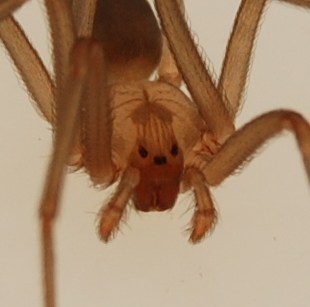
Can You Die from a Brown Recluse Spider Bite?
The short answer is no. Despite the many stories I heard growing up about damage from a brown recluse bite lasting forever, about bites slowly rotting away flesh and damaging the heart for years, they are just that. Old farmer’s tales or wives’ tales.
Now can brown recluse bites leave lasting damage? Absolutely. There are many confirmed cases of this. However, there are no confirmed fatalities from a brown recluse bite.
Not even indirectly. Although in fairness indirect causes of death, unless it’s a pandemic or something, are often very hard to pin down.
These stories come from multiple places. The problem isn’t people intentionally lying, the problem is not necessarily having the full story or mistaking something that can consistently kill people (bacterial infection causing blister-like ulcers) with brown recluse spider bites which sometimes have similar symptoms.
Like blister-like ulcers.
While a healthy person isn’t going to die from a brown recluse bite, there are still many good reasons for leaving these shy fellas alone…and for being careful to avoid them when you do catch sight of these small and elusive fellas.
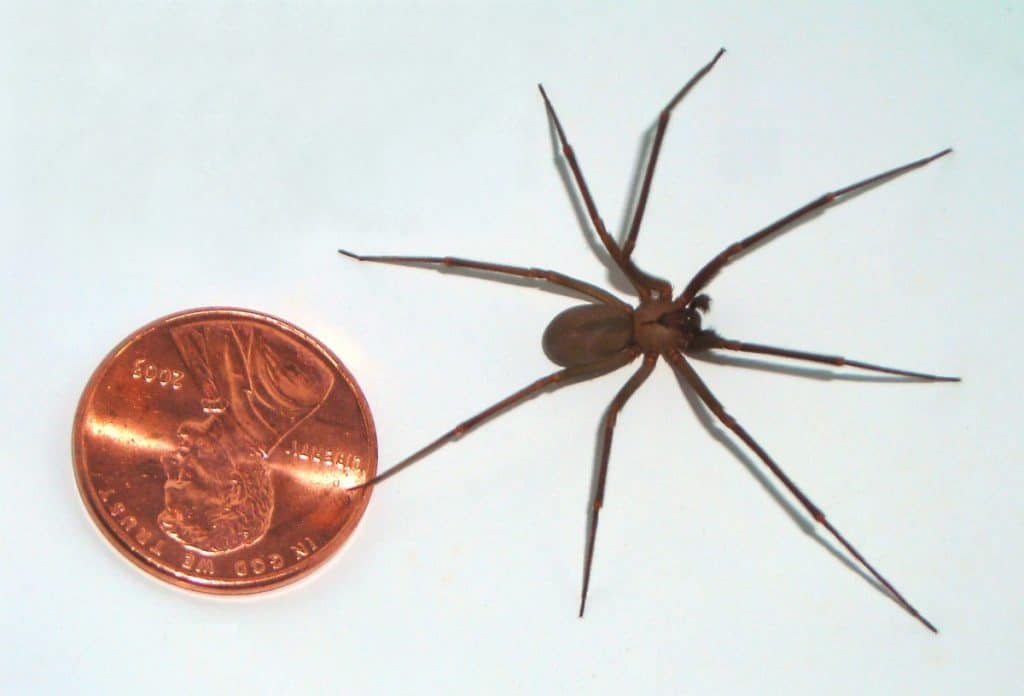
Brown Recluse Spider Symptoms
Different people are going to have different reactions to a bite. Some people can more or less walk them off. Other people have almost immediate severe reactions.
Almost everyone will have skin irritation and minor pain at first. This will be at the site of the brown recluse bite. The pain, itchiness, and burning sensations will often come before any physical evidence of a bite.
Even then, it usually takes time for the pain to show up. This is not an instantaneous sharp pain like a jellyfish sting or venomous snake bite. It takes some time to hit you.
Even then, you basically feel the impact of the bite before you see it.
After the pain the skin around the bite area will be red. This is often itchy, swollen, and some people report a bit of a burning pain. As the skin reddens you’ll be able to locate the exact bite area because of the red blisters that tend to form.
The venom from a brown recluse bite causes damage to blood cells. They rupture, not only damaging the cells themselves but the spillover of venomized and damaged blood spells into the rest of the body can create a cascading effect if left untreated.
This is how most of the extremely severe symptoms like convulsions, severe illness, and even skin necrosis. This is what causes the nastiest of injuries from a brown recluse bite and can lead to the need to replace muscle, remove damaged or dead flesh, and skin grafts.
Those are the most extreme cases, but they do exist.
List of Brown Recluse Spider Bite Symptoms
- Pain, burning, itching, irritation at bite site
- Red blisters form
- Red ulcers forming from the blister
- Extreme pain
- Fever
- Nausea
- Convulsions (extreme cases)
- Skin necrosis (extreme cases)
Here are a couple of pictures of Brown Recluse spider bites from Medicinenet.com.
The second one is a bit gnarly as it’s on its way to being a necrotic ulcer, aka as bad as a brown recluse bite, so you may what to scroll by quickly if you’ve got a weak stomach, but it lets you see what these bites look like so you know when you need treatment.
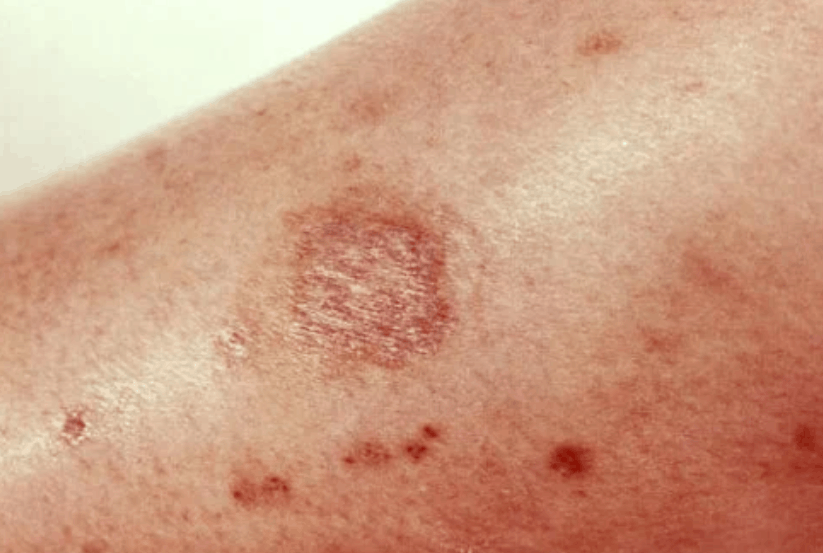
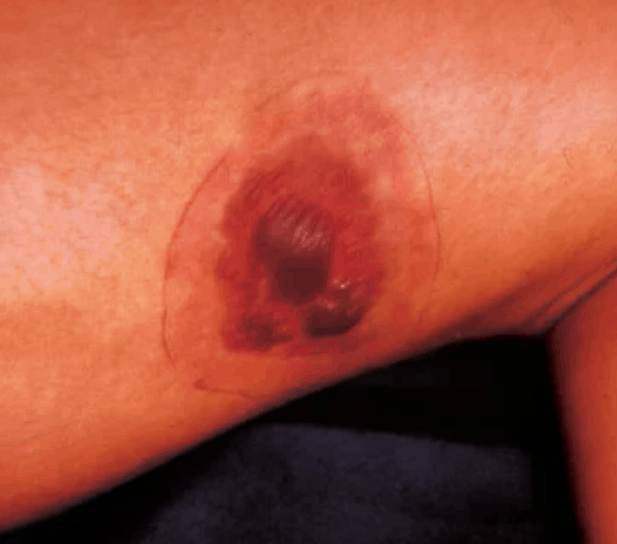
Can Brown Recluse Bites Cause Flesh Necrosis?
Yes. The bite of the brown recluse spider will not always cause flesh to rot and die, but this is a possible severe reaction to an untreated brown recluse bite. This is why at the first signs of an actual brown recluse bit you need to seek medical treatment.
That can be the difference between only suffering some pain and blistering or having deep tissue damage that requires surgical intervention and a skin graft to repair the outer scarring and damage.
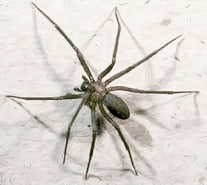
This is a relatively rare symptom for actual brown recluse bites, but it is something that can definitely happen. The first moment that a brown recluse bite is suspected, you need to seek medical attention to prevent these more serious symptoms from happening.
Even if it turns out to not be a spider bite but something often mistaken for a recluse bite like a bacterial infection, that’s still dangerous. Maybe even more so.
All the more reason to get to the doctor before the flesh literally rots away from the body. Aside from being incredibly painful and racking up insanely expensive medical bills, this can also prevent surgery and sometimes permanent restricted mobility or disability.
Not all injuries are spider bites
One thing that is definitely worth noting is how often other things are misdiagnosed as a brown recluse bite. This not only tends to add to the overly fearsome reputation of the brown recluse but also can lead to lower quality care of the patient.
The New England Journal of Medicine published this article which includes an eye popping 40 examples of injuries, bacteria, and other injury factors that have been mistaken for brown recluse spider bites.
Can a Brown Recluse Spider Kill My Pets?
There are no confirmed cases of a brown recluse bite killing a human being. However, it makes sense that if the venom can be that dangerous to people that you would then worry about your pets.
What if your dog or cat get bit by a brown recluse? How dangerous is the bite to them?
This is a complicated question, and can depend on the health/immune system of the individual pet, its age, and at times even its breed as some tend to have better/worse reactions than others in limited data.
The short answer is that most cats will be fine, if irritated, assuming they aren’t old and don’t have a compromised immune system. Many dogs can walk it off but tend to have a more severe reaction.
In either case if you expect a pet has been bit they should go see a vet as a little bit of treatment can help ease the pet’s pain and help guarantee their health.
While brown recluse spider bites are rarely fatal to pets, there actually are instances of pets dying to the venom so this should be taken seriously as a concern.
Brown recluse bites definitely are more dangerous to pets than to people, though they need to be taken seriously in both cases.
Where Do Brown Recluse Spiders Live?
These spiders have a fairly wide habitat, especially the brown recluse (reclusa in the map below) yet this also helps to underscore how easy it is to incorrectly identify a harmless brown spider as a recluse.
Look at the map below. Those ranges aren’t wrong. There are no recluse spiders of any kind in Oregon, Colorado, Pennsylvania, or 99% of Florida, North Carolina, and Utah.
There are no brown recluse spiders west of Texas. Though other recluse spiders look close enough and can have a venomous bite so they should still be treated the same by the layperson.
The easiest way to properly identify a brown recluse is to see that they have more eyes than the average spider. Yeah – I don’t want to get that close, either.
Mis-identification is a major problem when it comes to the brown recluse. There are several recluse spiders that can be found in United States, but these very small and shy spiders like to stay hidden. They like cover.
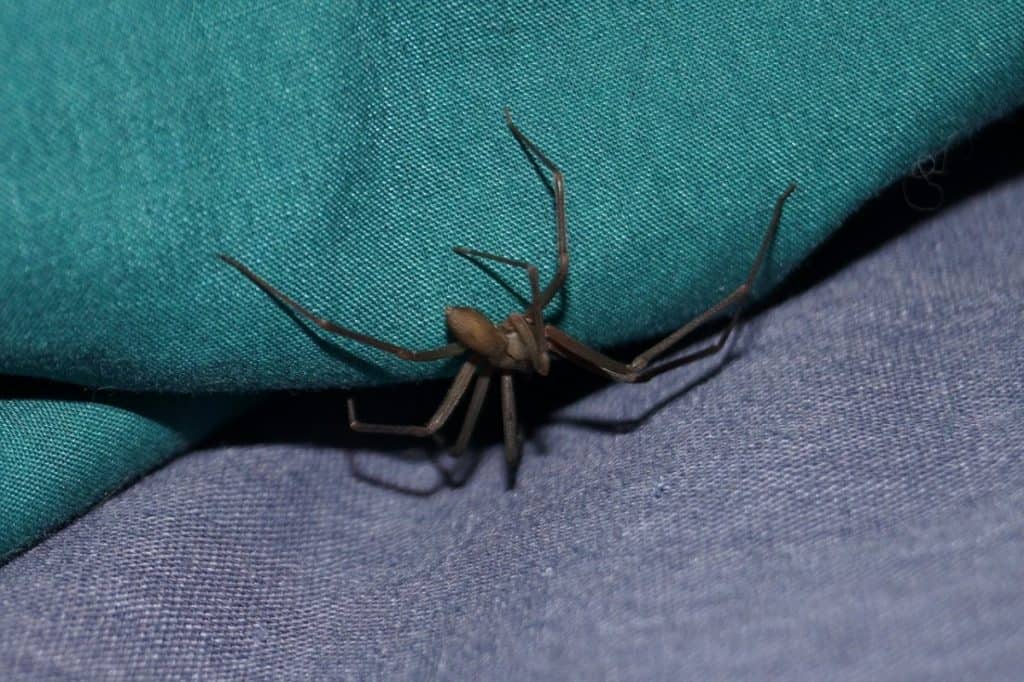
This means the majority of brown recluse sightings are actually false sightings. Throwing the stories and attempts to record data on these spiders even more into confusion.
Here’s a map courtesy of the Department of Entomology at UC-Riverside showing where the six sub-species of recluse spiders that can be found in the United States live.
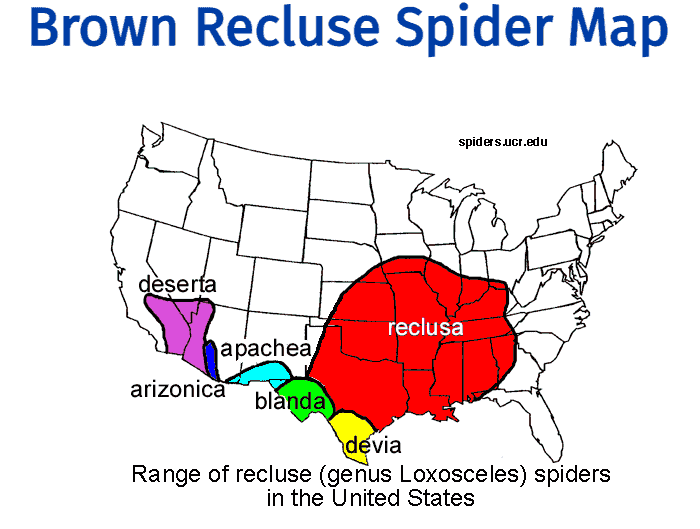
Brown Recluse Spiders FAQ
Q: How many people have died from a brown recluse spider bite?
A: There are no confirmed fatalities as a result of a brown recluse spider bite in the United States as of 2020.
Q: Are other recluse spiders poisonous?
A: First to get the obvious out of the way, spiders aren’t poisonous they are venomous. Poison means they affect you when you eat them. Venomous is when they can “poison” you through stings or bites. With that “almost semantics” out of the way, all recluse spiders should be treated with the respect that you would show a brown recluse.
Q: Can you identify a brown recluse by their web?
A: Not consistently, since spiders in many places are going to react to their environment to give themselves the best place to spot prey (case in point – the one that loves to remake a web every single day in the frame of our side door to catch insects attracted to the light), however brown recluse spiders do have a reputation for creating unusual irregular webs.
If you see a lot of small brown spiders by a lot of webs lacking any sign of pattern or symmetry…probably best to leave all that be.
Q: Does peppermint oil keep away brown recluse spiders?
A: Despite some dubious online claims to the contrary, no. There is no evidence that this is the case.
Q: Do mothballs help keep brown recluse spiders away?
A: While mothballs do tend to have that weird effect on helping to deter certain pests, it’s important to realize a few things. One, do you really want cotton balls and strands all around the house?
Two, using mothballs still isn’t a guarantee.
Three, with brown recluse spiders you have to consider the Z-axis. A mothball on the floor doesn’t matter if the spider is crawling the top of the wall.
Q: How can I get rid of brown recluse spiders?
A: If the spiders around your place actually are brown recluse that is difficult. They are incredibly adaptive spiders that can go a full 10 months without food and water and still survive.
The best you can do is avoid creating temptations like lots of dead flies by the window sills, leaving wet clothing or towels on the floor, or checking socks and shoes before putting them on.
You’ll need experienced exterminators to control a large population and even then you should think of it as management as opposed to 100% efficiency, which is impossible to guarantee.
In Conclusion
When it comes to brown recluse spiders, a little bit of caution is always a good idea. While you’re not going to die from one, or even multiple, brown recluse spider bites, they can cause permanent damage that you will want to avoid.
That said, the fear of brown recluse spiders is generally way higher than the realistic threat and because of that you shouldn’t freak out when seeing one. Give it its space, and you find it’s more than happy to scuttle out of sight never to be seen again.
If you are unfortunate enough to get bit, put an ice pack on the area, and seek medical attention immediately. You’ll be thankful you did.
